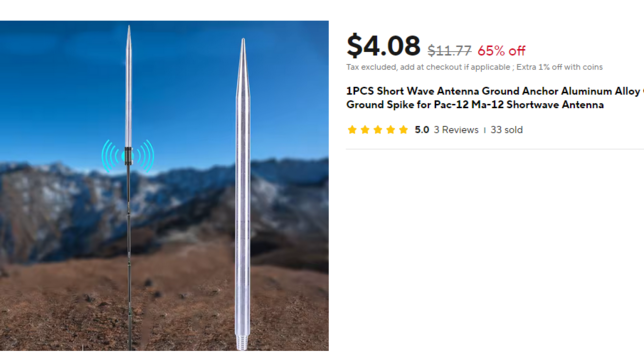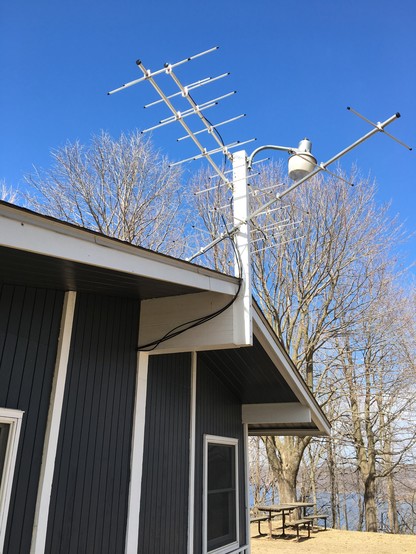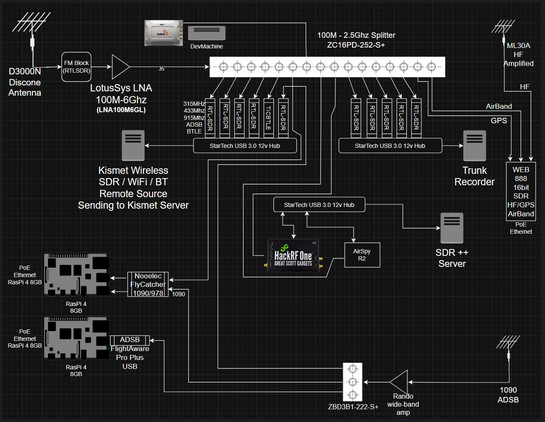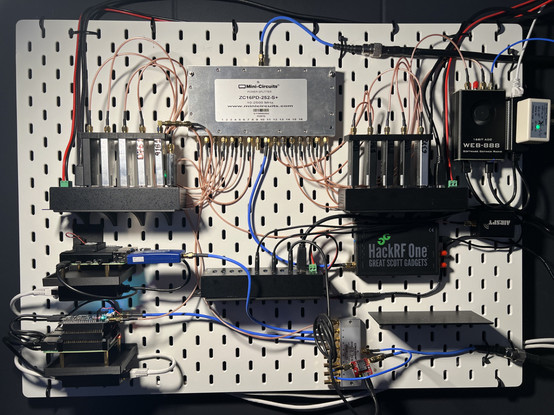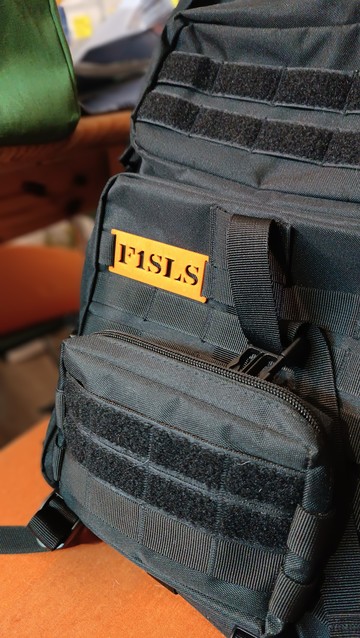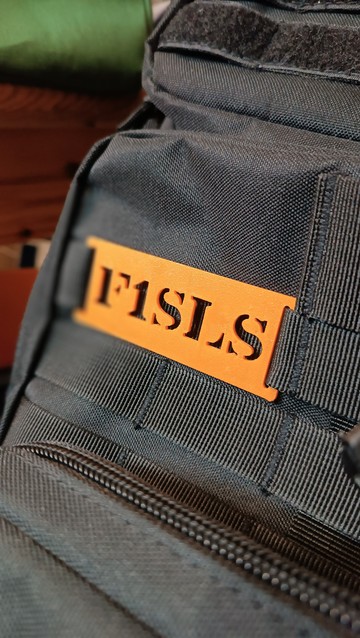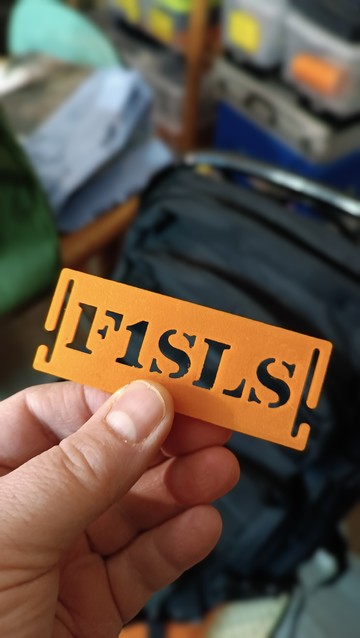Recent searches
Search options
#antennas
These antennas on a shelter building at Frontenac State Park in Minnesota attract attention.
What are they?
If you follow the coax lines inside you find they lead to a dusty old Home Depot storage bin in the corner, with a label—
"What is this thing?"
• This box, along with the antennas outside, is a Motus station
• Motus stations detect signals of tiny transmitters fitted to birds, bats, and insects to track their movements across North America
• The transmitters are harmless to animals, and eventually fall off
• At Frontenac State Park, we want to understand how the Mississippi River Valley is being used during migration
I was tempted to peek at the equipment inside … but was admonished not to … and I didn't.
Simple Wire Antenna: Giuseppe’s Mediumwave DXing Adventures from the Tyrrhenian Sea
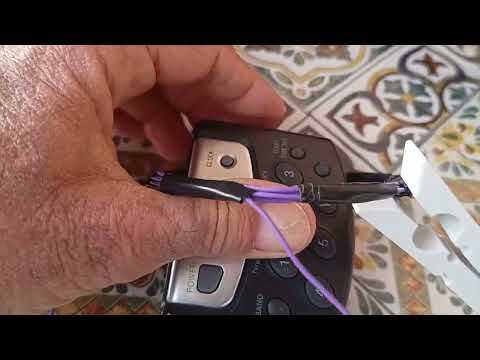
Finalizing the "Wall of SDR" ...
P25 in to Trunk Recorder
Multiple SDR into Kismet Wireless for 315/433/915/1090 and also a BT TIC for BTLE monitoring
Multiple SDR into SDR++ Server for local Amateur Radio Repeaters monitoring
Dedicated line to another machine for just specific testing.
And then finally documented.
#SDR #SoftwareDefinedRadio #AmateurRadio #HAMRadio #RTLSDR #BladeRF #KismetWireless #Kismet #WiFi #BTLE #Diagram #Documentation #WiresWiresWires #Antennas #ADSB #1090
Poynting Antennas is an internationally recognised manufacturer of antennas based in South Africa
“Poynting Antennas founder and CEO Andre Fourie is not only an entrepreneur and former Wits University professor; he and his team are arguably the top antenna engineers in the world. Poynting has over 50 patents and registered trademarks, including ...continues
An 160M EFHW is about 240' long. It will naturally be resonant on 60 and 6M s well. That's about 100 more feet that I have available. If I cut to the same length as an 80M EFHW, some 120' or so, and bringing it into resonance on its primary band with a loading coil, will it still be resonant on 60 and 6M or will it be monoband?
@HopelessDemigod Try the #HF Activity Group today and find out where that antenna will reach.
They start on 18.157.5 MHz - 17:30~18:30 UTC
Spot yourself at
www.hfqso.com
and they'll call you in.
#HamRadio #AmateurRadio #DX #Antennas
How Can A Lossy Wire on the Ground Work Better Than A Quarter Wave Vertical Antenna?
Let’s get real here! If we lay a wire antenna on the ground, surely It can’t radiate more power than that cool-looking, expensive quarter-wave whip you just spent a small fortune to buy? Well, yes it can – but with a few caveats.
We can use a trick of geometry to support our claim. Our magic wire antenna has a footprint on the ground of only one square foot. The cool, costly ground-mounted whip has a footprint on the ground of only one square inch (ignoring the radial field). Bigger is better yes? Not convinced?
Okay, let’s unravel the geometric trickery while still maintaining our original claim. You might picture one square foot as a small square with equal sides of one foot. Therein lies the trickery. If we take 144 feet of wire of 1/12 inch diameter and tightly wind it into a square with sides of one foot, we’ll have a footprint on the ground of one square foot. Now let’s unwind that wire and stretch it out in a straight line along the ground. It is now 144ft long and 1/12 inch wide which is still one square foot.
Enough of the mathemagical sleight of hand; there is a much more convincing way of proving our point. Everybody knows that an antenna wire laid directly on the ground is lossy and, for once, everybody is right. But, only a few of us know how to take advantage of such a wire and make it a very useful antenna. I have personally enjoyed multiple QSOs with wires on the ground – despite the losses. I too was a skeptic until I actually tried it.
The theory of why it works has been covered in previous posts on this blog. The secret is that the wire has to be at least one wavelength (and preferably multiple wavelengths) long. The radiation pattern is a directional beam with low elevation.
As we can see in the far field plots above, EZNEC predicts an elevation angle of 25 degrees and a beamwidth of 54 degrees. However, the antenna has a loss of 3.9dBi. If we allow for the fact that some signal is also radiated outside the main beam, let’s treat that loss as, say, 5dBi.
Now compare that to our quarter-wave vertical for which we can estimate unity gain with a beamwidth of 360 degrees.
Now a clearer picture is beginning to emerge. If we calculate the RF energy within a beamwidth of 54 degrees for both antennas we can see how they compare. Let’s say our transceiver puts out 100 watts (I can hear QRP diehards loading for bear here). The lossy wire on the ground will only radiate 30 watts. The quarter-wave vertical will radiate all 100 watts but spread over 360 degrees. Within the beamwidth of 54 degrees, the vertical will radiate only 15 watts!
Gadzooks! A reel of wire costs only a few bucks but can radiate twice as much power as a shiny whip costing significantly more? Date check: yes it’s still January, not the first of April. Admittedly, this is a theoretical analysis lacking rigorous procedures for a proper engineering investigation. But, once again, I have personally made QSOs with more than one wire-on-the-ground antenna. Were my signal reports very poor? Absolutely not. This is not a spoof post, trust me.
There is another advantage of this wire-on-the-ground antenna when compared to a quarter-wave whip. Vertical antennas are generally considered to be susceptible to vertically-polarized noise. A wire on the ground is relatively immune to noise because of its inherent signal loss.
I don’t recommend selling your shiny, expensive whip and replacing it with some wire strewn across your backyard. However, imagine the possibilities when operating out in the Big Blue Sky Shack. A long wire can be concealed in a ditch, or in tall grass. Store it on a fly-fishing reel, then when you have finished operating simply reel it back in. It is the ultimate stealth antenna which could also be useful in a HOA situation.
Help support HamRadioOutsidetheBox
No “tip-jar”, “buy me a coffee”, Patreon, or Amazon links here. I enjoy my hobby and I enjoy writing about it. If you would like to support this blog please follow/subscribe using the link at the bottom of my home page, or like, comment (links at the bottom of each post), repost or share links to my posts on social media. If you would like to email me directly you will find my email address on my QRZ.com page. Thank you!
The following copyright notice applies to all content on this blog.
This work is licensed under a Creative Commons Attribution-NonCommercial-NoDerivatives 4.0 International License.
Unusual antenna in the news.
"The CHIME array outside Penticton, British Columbia, is a novel radio telescope that has no moving parts. Designed to map hydrogen gas in the universe, it is also ideal for detecting fast radio bursts."
https://news.berkeley.edu/2025/01/21/astronomers-thought-they-understood-fast-radio-bursts-a-recent-one-calls-that-into-question/
I want to run some wire antennas between two trees. If I put a steel I-hook on each tree 20-25 ft up, how do I simultaneously keep the EFHW antennas from drooping and allow for the trees to sway independently in the wind and not snap the wires? #hamradio #amateurradio #antennas
The late Bob Heil K9EID describes using a bird dog training device to throw a wire over a tree.
"The neighbors thought I was out on the shooting range. One of them came over. I mean, it is amazing. That thing went—not kidding you—at least 150 to 200 feet high."
Hams will understand the excitement! Found this while cleaning up a closet. Not sure what the switch does. 300 ohm to 75 ohm balun. Will it QRP? SWL antenna only? I have some 300 ohm twin lead around somewhere. A little doublet maybe?
Monday is January's #FullMoon — the #WolfMoon.
It's now exactly 2 #lunar cycles to the #TotalLunarEclipse on 2025 Mar 14, the Night of the #KrononautMoon, and our invitation to #TimeTravelers to come visit or send us a #quantum #signal. (To be followed by 2 more Total Lunar Eclipses in the next year!)
Here's our extended version #Checklist for the Night of the Krononaut Moon, a celebration of Time Travel. (Original post located here: https://me.dm/@KronoMoon/113610202533882675).
Coming our way next on 2025 Mar 14 #UTC 07:00, 2 months from now.
#Observe the #Moon & #stars that night, wherever & however you like, with friends & colleagues or on your own. Local #times flexible.
#Connect with the #cosmos & with your #past & #future #selves. Send a #signal to #beings in the #future(s). #Candles & safe #campfires are good; #music & #dancing are good; #radio #wave #antennas are good. Be experimental!
Click & share many #photos of the #Moon, with you (and your #family / #pets) under it — what we call a #Moonsie — and any nearby #UFOs. Share your #images with @KronoMoon & @KronoMoonPhotos.
#Enjoy a deepened #moment of #peace, #love, #authenticity & #meaning, with other #Mastodonians around the #world & #beyond — wherever you are.
I borrowed a NanoVNA from @mathias and tested my Meshtastic antennas...
The one shown here (with a 915MHz sticker) appears to actually be okay! It was an AliExpress find.
(For anyone smarter than me, does this look good? SWR of 1.225 acceptable?)
The antennas that ship with the Heltec V3 boards seem to be pretty bad at 3.998. (Well, they do come free with it.)
Are any of the stealthy HF flagpole antennas any good? Do they generally have radials? I'm skeptical of tuner-only vertical antenna designs with no radials. #hamradio #amateurradio #HF #antennas #stealthantenna
A File Worth Having: Bob’s guide to building an Electrically Small Resonant Loop Antenna for Mediumwave Reception


